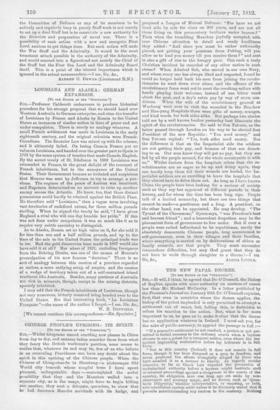LOUISIANA AND ALASKA: GERMAN EXPANSION.
rTo TRH EDITOR OF TRH " SPECTATOR."]
SIR,—Professor Caldecott endeavours to produce historical precedent for his strange proposal that we should hand over Western Australia to German enterprise, and cites the transfer of Louisiana by France and Alaska by Russia to the United States as instances of similar action in time of peace and not under compulsion. There is surely no analogy whatever. A small French settlement was made in Louisiana in the early eighteenth century, and the original colonists were French- Canadians. The financier Law was mixed up with the scheme, and it ultimately failed. On losing Canada France put no value on Louisiana, and handed over the greater part to Spain in 1763 by the same system of treaties that made Canada English. By the secret treaty of St. Ildefonzo in 1800 Louisiana was retroceded to France, to the great delight of the remnant of French inhabitants, but to the annoyance of the United States. Their Government became so irritated and suspicious that Monroe was sent by Jefferson to try to arrange a pur- chase. The rupture of the peace of Amiens was imminent, and Napoleon determined on no account to raise up another enemy across the Atlantic. He knew, too, that these distant possessions could hardly be retained against the British Fleet. Ho therefore sold " Louisiana," then a vague term involving vast territories of undefined extent, for three million pounds sterling. When be signed the treaty he said, "I have given England a rival who will one day humble her pride." If this was not done under compulsion it was so much like it as to require very subtle casuistry to distinguish.
As to Alaska. Russia set no high value on it, for she sold it for less than one and a half million pounds, and up to the time of the sale to the United States the principal trade was In ice. Had the gold discoveries been made in 1867 would she have sold it at all ? Her ukase of 1821, excluding foreigners from the Bohring Straits, was one of the causes of Monroe's promulgation of his now famous "doctrine." There is no sort of analogy between this cession of a province regarded as useless, a mere outlying scrap of empire, and the cession of a wedge of territory taken out of a self-contained island continent like Australia. Besides, many portions of Australia are rich in minerals, though, except in the mining districts, sparsely inhabited.
I may add that the French inhabitants of Louisiana, though not very numerous, bitterly resented being handed over to the United States. See that interesting book, "La Louisiane Frangaise "—the name of the author I forget.—I am, Sir, Sue, W. B. DUFFIELD. [We cannot continue this correspondence.—En. Spectator.]






















































 Previous page
Previous page